Some movies have such a powerful influence over our imaginations that we cannot help but reflect on their enduring truths. One such film that captures my imagination and touches upon spiritual realities is the award-winning French film Of Gods and Men (2010) by Xavier Beauvois. Based on the true story of the Trappist monks of Tibhirine, Algeria, who lived peacefully among the Muslim population, and now find themselves caught in the center of a civil war. Encouraged by the civil authorities to leave the country, the monks must decide to either stay and face the possibility of martyrdom or abandon their flock and return to their native France. The film offers a sacramental lens to examine the transforming power of Christ’s Eucharistic presence and sacrifice in our lives.
Using the film Of Gods and Men in a cinema divina format can help us consider the film’s themes of presence and sacrifice through a liturgical and theological lens. Cinema divina is based on lectio divina and involves a “divine viewing” of the movie while also reflecting on a Scripture passage related to the story. We dialogue with the story, pray over the Holy Spirit’s movements in our soul in response to the movie, and act upon what the film and Scripture call us to do in our everyday lives. Praying the movie in this manner can help us recognize the reality of Christ’s presence and sacrifice in his Word and Eucharist in the Sacred Liturgy as well as in our own lives through the process of theological reflection and liturgical prayer.
Martyrs show us, after the example of Jesus on the cross and on the altar, how through the daily offering of their lives they carry Christ’s presence to the world. Their stories reveal the almost imperceptible transformation that takes place in the soul through the encounter with Christ. Of Gods and Men depicts how Christ’s presence in his Word and Eucharist directs us to offer our lives with him in love.
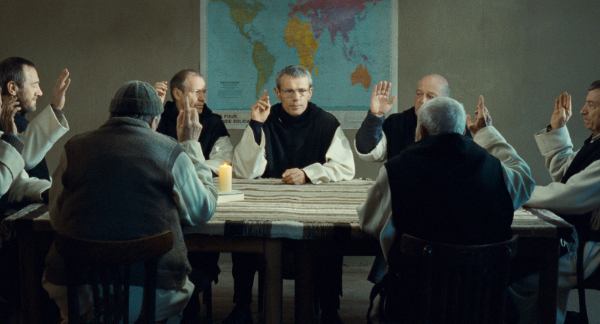
© 2010 Sony Picture Classics. All rights reserved.
Let’s begin by reading a passage from the Letter to the Hebrews.
Scripture: Hebrews 9:24-29
"For Christ did not enter a sanctuary made by human hands, a mere copy of the true one, but he entered into heaven itself, now to appear in the presence of God on our behalf. Nor was it to offer himself again and again, as the high priest enters the Holy Place year after year with blood that is not his own; for then he would have had to suffer again and again since the foundation of the world. But as it is, he has appeared once for all at the end of the age to remove sin by the sacrifice of himself. And just as it is appointed for mortals to die once, and after that the judgment, so Christ, having been offered once to bear the sins of many, will appear a second time, not to deal with sin, but to save those who are eagerly waiting for him.”
Scriptural Reflection:
Christ’s sacrifice was not only at the time of his suffering and death, but from the incarnation onwards. We see this reflected in the Liturgy of the Word and the Liturgy of the Eucharist. Christ’s life was a complete surrender to the Father. The Liturgy is a “memorial of his sacrifice” in which the bread and wine through the Holy Spirit becomes Christ’s body, blood, soul, and divinity. His sacrificial offering becomes our food in Holy Communion, in which we receive the life of Christ into our very beings. We also receive his sacrifice through an attentive listening of the Word which expresses God’s sacrifice for his chosen people throughout salvation history.
The Word of God appeals to humanity’s deepest yearnings. It draws us into conversation with God who speaks to us and hears our pleas for help as we face the challenges of what it means to live the Word in our everyday existence. The Word that existed before all creation, became one of us, a human being, to draw us out of the darkness of suffering into the glorious light of God. Jesus Christ transforms us by his presence and sacrifice in the Scriptures which we hear proclaimed during the Liturgy and are called to absorb into our very being.
The Eucharist is both Christ’s real and enduring presence with us tangibly and physically through the appearance of bread and wine. It is also his sacrifice of loving obedience to the Father. At the Institution of the Eucharist during the Last Supper, Jesus reminds us, “Do this in remembrance of me” (Lk 22:19). The assurance of his presence calls us to celebrate the Liturgy to keep him with us as we deal with the sin and suffering of our lives. The bread broken is his sacrifice to remain with us as we journey to our eternal destination. It is the offering of his love to sustain us and give us the hope of heaven where we will see him “face to face” (1 Cor 13:12). His sacrifice transforms us and gives us life, the life of God in our very beings, so that we may become gift to others and carry his salvation to the world.

Photo credit: unsplash.com
Lectio: What is the film about? What do the words and images, characters, form, and genre say to me? What does the film say about Christ’s enduring presence in his Word and Eucharist? How do the monks live a Eucharistic life of sacrifice and what effect does that have on their decision to stay in Algeria to face persecution?
The Trappist monks of Tibhirine became living examples of Christ’s presence and sacrifice in the Muslim majority country of Algeria where they found themselves caught in the middle of a civil war between the government’s army and Islamic extremist rebels. The film Of Gods and Men shows the monks’ surrender to the Lord by their offering of love for others expressed in their sacrificial lives of prayer, work, and service. They were daily transformed by the presence of Christ in his Word and Eucharist who prepared them to become bread broken for the life of all. It depicts the simplicity of their daily lives through prayer in the Chapel for Mass and Liturgy of the Hours, work, and service to the Muslim people of the village. Their lives speak to their intimate union with their Crucified Master depicted through images of the crucifix in multiple scenes. As they pray together, labor in the fields, and serve in the medical clinic, they become the presence of Christ’s Word and Eucharist among their Muslim neighbors.
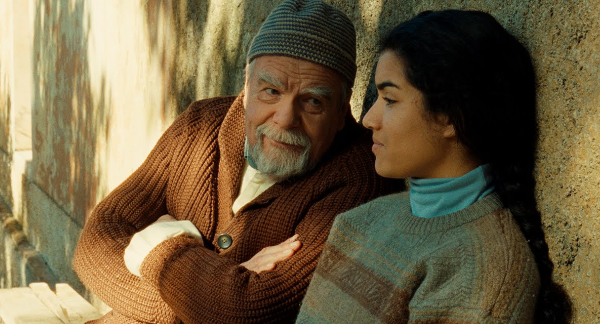
© 2010 Sony Picture Classics. All rights reserved.
The Word in Of Gods and Men
The Trappist monks live in continuous awareness of Christ who informs their presence to God, one another, and the people of the village. The director, Xavier Beauvois, inserts the audience into the communal prayer of the monks through an overhead shot panned out to view the whole community praying in choir. Their lives of consecration as a community are nourished by the Scriptures which they read during the Sacred Liturgy and by chanting the Psalms in the Liturgy of the Hours. The film opens with a quote from Psalm 82: “I have said, you are gods; and all of you are children of the most High. But you shall die like men, and fall like one of the princes” (Ps 82:6-7). It is deeply reflective of a liturgical theology relevant to the crisis happening outside the monastery. Multiple scenes contrast the destructiveness of the Algerian civil war with the peacefulness of the monks praying, who at the same time realize their own mortality. The Word, made visible in the film through imagery and song, roots the monks’ presence and offering in Christ.
As the destruction of war approaches, the monks are warned by government officials to leave Algeria and return to France, their country of origin. When members of the Armed Islamic Group (GIA) led by Ali Fayattia (Farid Larbi) enter the monastery compound on Christmas Eve, Father Christian (Lambert Wilson), the abbot of the community, tells them that this is a “house of peace” and to put down their guns or else they speak to him outside the monastery grounds. Fayattia follows Father Christian outside. Christian then refuses their request for the help of the sickly physician, Brother Luc (Michael Lonsdale) and their meager medical supplies. He tells them that this is the night they celebrate the “Prince of Peace.” Fayattia backs off and even offers Christian a handshake as a sign of peace. The terrorists leave, but the community is shaken. They go to the Chapel to celebrate Christmas Eve Mass and allow the Word to inform their decision to stay or leave Algeria. During the Liturgy they process in with a statue of the Baby Jesus the Word made flesh, which they place in the Nativity scene—a symbol of acceptance of Christ’s Word in their lives.
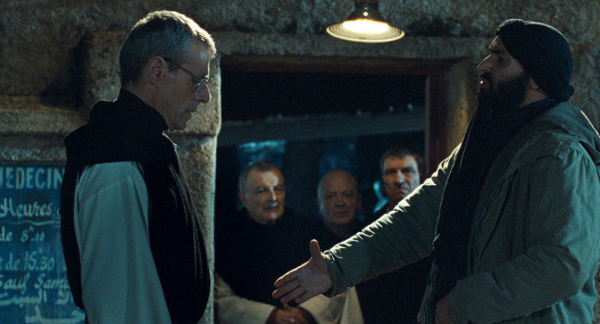
© 2010 Sony Picture Classics. All rights reserved.
The Eucharist in Of Gods and Men
The monastery chapel becomes the central focal point of the film’s drama. Every scene of the monks praying and celebrating Liturgy reflects their inner contemplation of the ultimate sacrifice which they realize is imminent if they remain in Algeria. Through the Eucharist, Christ is present in their suffering as they are with the people of the village. The government sends them a definitive letter to leave the country. Each monk must reckon with his own conscience. Brother Christophe (Olivier Rabourdin) walks out in the fields with Father Christian sharing his fears about martyrdom, “Dying here and now, does it serve any purpose?” To which Christian responds, “Remember, you’ve already given your life. You gave it by following Christ when you decided to leave everything.” Christophe retorts, “Why be martyrs? For God? To be heroes?” Christian says, “No, no, no! We’re martyrs out of love, out of fidelity…. Remember that love is eternal hope. Love endures everything!” Christian reminds Christophe that their religious life is already a type of martyrdom, a sacrificial presence for Algeria. Through religious vows they have surrendered everything to the Lord, just as he has given of himself in obedience to the Father. Their life is both Eucharistic presence and sacrifice.
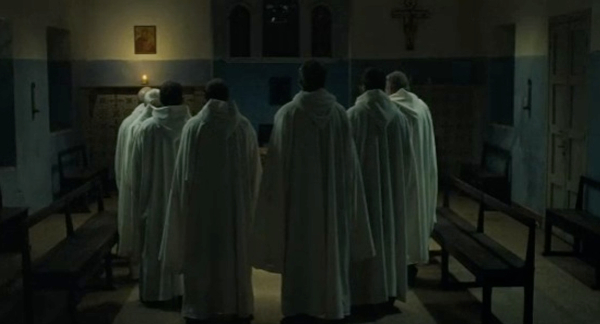
© 2010 Sony Picture Classics. All rights reserved.
They go about their daily sacrifice united to Jesus in the Eucharist which they celebrate together in the Liturgy and receive in communion. The reality of suffering in the Scripture forms their minds and hearts to their union with Christ, the Suffering Servant. Chanting the Divine Office, they sing Psalm 143, “The enemy pursues my soul, he has crushed my life to the ground, he has made me dwell in darkness, with the dead long forgotten…. Answer me quickly, O Lord. My spirit fails within me. Do not hide your face from me, lest I become like those who fall into the pit” (Ps 143:3,7). After their prayer, the camera moves to show each monk in his cell praying, weeping, or writing. Brother Luc leans up against and kisses the image of Christ’s betrayal and arrest—a powerful visual of self-sacrificing love. Each one unites his sacrifice with that of his Lord and Master through his self-offering. Afterwards, in the middle of the night, the Islamic terrorists raid their monastery taking seven monks hostage. Two remain hidden in their rooms undisturbed. The film ends with the monks being led through the snow to a place deep in the woods with the voiceover of Father Christian reading his spiritual testimony he left in a letter on his monastery desk. In the trudging, snowy march to death, the monks make of their lives a sacrificial offering in the example of Christ, their Master, so others may have life. Through the daily living of a Eucharistic life, they made the ultimate sacrifice of love.
Meditatio: What are my feelings as I experience this film? What is it saying to me about the quality of my own faith? Have I ever experienced persecution because of my beliefs? Where did I find strength in those circumstances? How do I face my own fears? Would I be willing to sacrifice my life for the sake of Christ? What sacrifices am I called to in my own situation?
Too often we can go on in life saying we are followers of Jesus, but do not integrate that discipleship in our everyday choices. This film challenges us to consider how we live our relationship with Christ in the details of our lives. The monks did not look for martyrdom. But they did live the Liturgy in their daily lives after the example of Christ through simple acts of selflessness, sacrifice through hard work and community living, and presence to one another and to their neighbors in need. The Church speaks of a martyrdom of desire, that is, a discerned, constant, sacrificial love by choosing to follow God’s will, not ours, in every circumstance.
Oratio: Let your spontaneous prayer flow from reading and meditating on the film and/or Scripture.
Lord, I pray that I may allow your presence in the Word and Eucharist to transform me, so that my daily actions and choices may reflect your presence in my life and allow me to become an example of your selfless offering to the world. I desire to emulate your self-giving love. Help me to be an authentic disciple who imitates the Master in all I think, say, and do. Amen.
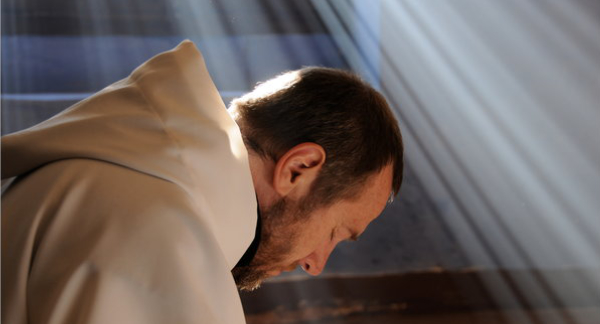
© 2010 Sony Picture Classics. All rights reserved.
Contemplatio: Spend some time relishing the film as a spiritual experience.
Christ’s presence and sacrifice in the Word and Sacrament create one redemptive act of love that transforms us if we open ourselves to conversion. As the Trappist monks show us, our daily sufferings have meaning when we unite them to the sufferings of Christ. His sacrificial presence with us in the Liturgy assures us that we are not alone in our offering of our sufferings to the Father. Through the Liturgy we encounter Christ most intimately, as Pope Francis says, “In the Eucharist and in all the sacraments we are guaranteed the possibility of encountering the Lord Jesus and of having the power of his Paschal Mystery reach us.” The Trappist martyrs of Tibhirine shine as examples of those who became what they prayed and believed: lex orandi, lex credendi, lex vivendi. They were the presence and sacrifice of Christ in their quiet monastery in the turbulent world of an Algeria gripped by war.
Actio: As a result of viewing this film and praying with it, what concrete action is the Holy Spirit calling you to take beyond the film into your everyday life and the world?
As Catholics, the more we understand the Word of God and the Eucharist as presence and sacrifice, the more we allow Christ’s sacramental grace to touch our lives in concrete experiences of daily life and convert our hearts to him. Christ’s manifold presence in the Liturgy confronts our humanity, transforms our existence, and immerses us in the community of Christ’s body. Imbued with his presence and encountering his sacrifice of love we are renewed and transformed to become the presence of Christ in the world. We begin to see our suffering as a sacrificial offering united with Christ thus changing us and bringing life to those we encounter. The Word made flesh continually gives himself up in love and does what human love longs to do, says Pope Benedict XVI, “open the door, in death, to resurrection."”
Converted, transformed, and imbued with Christ, like the martyrs and saints before us, we become his sacrificial presence in the world bringing light to those in darkness and hope to those longing for redemption.